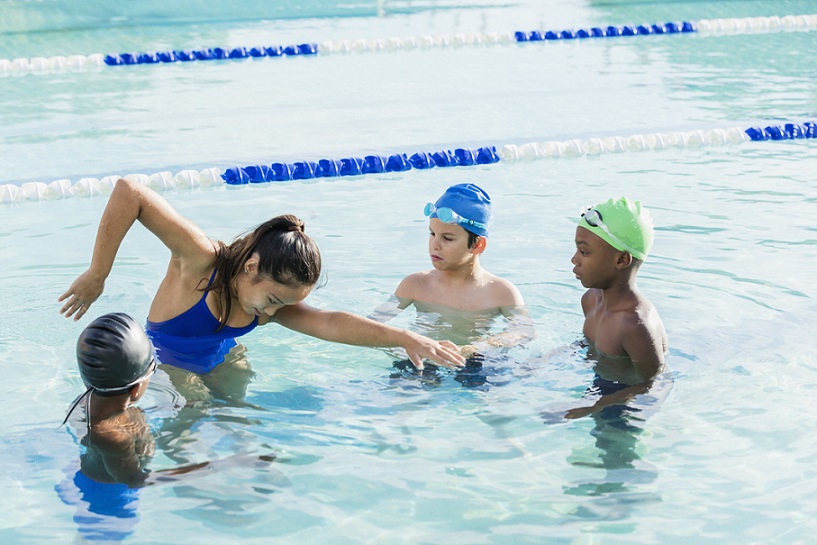Learn to Swim with Prince William County Parks

National Learn to Swim Day is May 18, and with summer coming up there’s no better time to learn how to swim or even improve your swimming skills. There are so many benefits that come from knowing how to swim, from safety to health benefits, to the recreation and leisure activities it opens up. And most importantly the fun! Swimming is a lifelong skill to have, and it is never too late to learn.
Water Safety Instructor Aniyah Henderson, who has been teaching swim lessons for almost a year, learned how to swim at age 17.
“I didn't learn how to actually swim until taking the class to become a WSI,” says Henderson. “Before taking my WSI class I only knew how to doggy paddle, because that’s how I’d done it since I was young, and no one ever corrected me. I was never put in a swim class, so until the age of 17 I never learned how to swim the correct way.”
Henderson now teaches the valuable life skill of swimming to others as an instructor with Prince William County Parks and Recreation.
“It is so important to learn how to swim because those skills can save your life or someone else’s. It is also a great way to get your body moving and challenge yourself.”
The health benefits from swimming are numerous. It is a great low-impact exercise that uses multiple muscle groups making it an ideal cardiovascular workout.
Studies have shown that swimming is also good for your mental health. According to the CDC swimming can improve mood in both men and women. For people with conditions like fibromyalgia, swimming can decrease anxiety, and exercise therapy in warm water can decrease depression and improve mood. Water-based exercise can improve the health of pregnant people and has a positive effect on the pregnant person’s mental health. Parents of children with developmental disabilities find that recreational activities, such as swimming, improve family connections.
If you don’t know how to swim but want to learn, Henderson shares what a typical swim lesson looks like for a beginner.
"You’ll first learn how to be comfortable in the water, that is the number one priority. A person will not be able to swim if they are too afraid to get their face in the water or even blow bubbles. The very basics of swimming require you to be comfortable getting your feet off the floor and having your whole body wet.”
“It sounds simple, but this is definitely the biggest challenge I face when teaching. It is something that is new to a lot of people, so it’s a fear that can be difficult to overcome,” she adds.
When asked what she thinks are the keys to learning how to swim, Henderson says “dedication and confidence.”
She adds that those who are brave enough to try new skills regardless of their reservations tend to learn quicker.
“The students who come back every class with an eagerness to learn almost always end up retaining the most information, and this shows in their swimming.”
Henderson loves seeing the fruits of her labor as an instructor, who teaches all age groups how to swim.
“I love making an impact on people’s lives. It’s so rewarding when people come into the center feeling unsure about their abilities and then leave feeling more confident and sure about their swimming.”
She adds, “It is especially nice when adults who have gone the majority of their lives being afraid of the water come in and I’m able to help them overcome their fears. My favorite part about being an WSI is that I’m making an actual tangible difference.”
Prince William County Parks and Recreation offers swim lessons for all ages, from babies starting at 6 months old, to teenagers and adults. Our swim lessons fill up fast so be sure to register sooner than later. If your preferred level/session is not currently available, please click here to sign up for reminders about swim lesson registration and get the latest information on lessons and important dates.